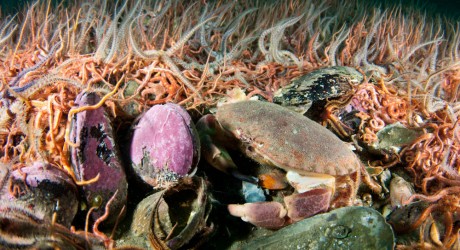A DIVING expedition off the north coast of Scotland is set to discover the secrets of mussels as big as size nine shoes.
The scientific diving team from Heriot-Watt University’s School of Life Sciences is researching the habitat of the Horse mussel in Scapa Flow, Orkney.
These huge mussels, as big as 25 centimetres long when adult, can live for up to 50 years in mussel beds which, in turn, provide an environment that is very rich in other species.
The team will look into methods for restoring the mussel beds when they are damaged, ways to monitor their environmental quality and the role of the mussel beds as habitats for fish and other sea creatures.
The researchers will also try and quantify the economic and other benefits provided by the Horse mussel reefs, compared to areas that are fished for edible species such as scallops and whelks.
Other Horse mussel reefs explored by the team include the largest found to date off Wick, which covers an area the same size as 380 football pitches and one in Wales that boasted nearly 300 different species and 5,000 individual animals in just 0.25sq metres (about the same size as two sides of A4).
They included giant sun stars and brittle stars, millions of which carpet the Horse mussel beds.
The team hopes to complete 100 dives over the next two weeks.
They also plan to dive on and around the famous WW1 wrecks of the German high seas fleet whilst living aboard Leask Marines’ ‘Sunrise’.
Accompanying the team is Richard Shucksmith, a wildlife and underwater photographer and writer, who will document the dives and life on board the research vessel.
Daily posts will go up on the team’s Facebook page featuring stunning images captured during their dives this week and next.
Dr William Sanderson, Reader in the School of Life Sciences at Heriot-Watt University, said: “We’re really looking forward to documenting these biodiversity hotspots off the coast of Orkney where tens of billions of organisms can be found living on just one Horse mussel reef.
“The giant Horse mussels are fascinating creatures though you would not necessarily serve them up as a gourmet treat!
“Due to their longevity, they’re not really edible. They are rumoured to be quite tough and probably have quite a lot of muck in them, but their age is also a fantastic way for us to discover clues about the environmental quality of their habitat and what we can do to protect these cold water reefs from damage.”
ENDS
For further information contact Giselle Dye at Pagoda PR, Tel 0131 556 0770 or email giselle.dye@pagodapr.com
Notes for editors:
1. Images and news of the expedition will be posted daily on the Team’s Facebook page here https://www.facebook.com/pages/Heriot-Watt-Scientific-Divers/236765533033031
2. Dr William (Bill) Sanderson is a MASTS Reader whose work focuses on the marine biodiversity research needed to support sensitive management and sustainable development. He has experience and ongoing research interests in Marine Protected Areas and Marine Spatial Planning (including Energy Developments). Bill’s research history in government has focused his interests on species and habitats of high nature conservation importance where he has worked to underpinned national marine policy, MPA designation, the formation of bylaws, proactive management, assessment and enforcement. Bill has served on three UK government monitoring groups developing the marine monitoring tools of as many European Directives; a role that he continues within the evolving Marine Strategy Framework Directive. He is Chair of the UK Rock and biogenic reef indicator development subgroup (for Marine Strategy Framework Directive); a Member UK Healthy & Biologically Diverse Seas Evidence Group.
3. About Heriot-Watt University. Established in 1821, it has campuses in Edinburgh, the Scottish Borders, Orkney and Dubai, and is investing £35 million in a new campus in Malaysia. Heriot-Watt University is in the Top Ten for graduate employment in the UK (over 94 per cent of graduates are in employment or further study within six months of graduation). The Sunday Times 2013 University Guide named Heriot-Watt Scottish University of the Year 2012/13; UK University of the Year 2012/13 for student experience; Number Nine in the UK overall . The National Student Survey 2012 (based on responses to all questions from FT degree students) placed Heriot-Watt at No 1 in Scotland and No 4 in UK.
MEDIA RELEASE posted by Pagoda PR. You too can post media releases (aka press releases) on allmediascotland.com. For more information, email here.
Contact: Pagoda Public Relations
Phone: 0131 556 0770
Email: giselle.dye@pagodapr.com
Website: http://www.pagodapr.com






